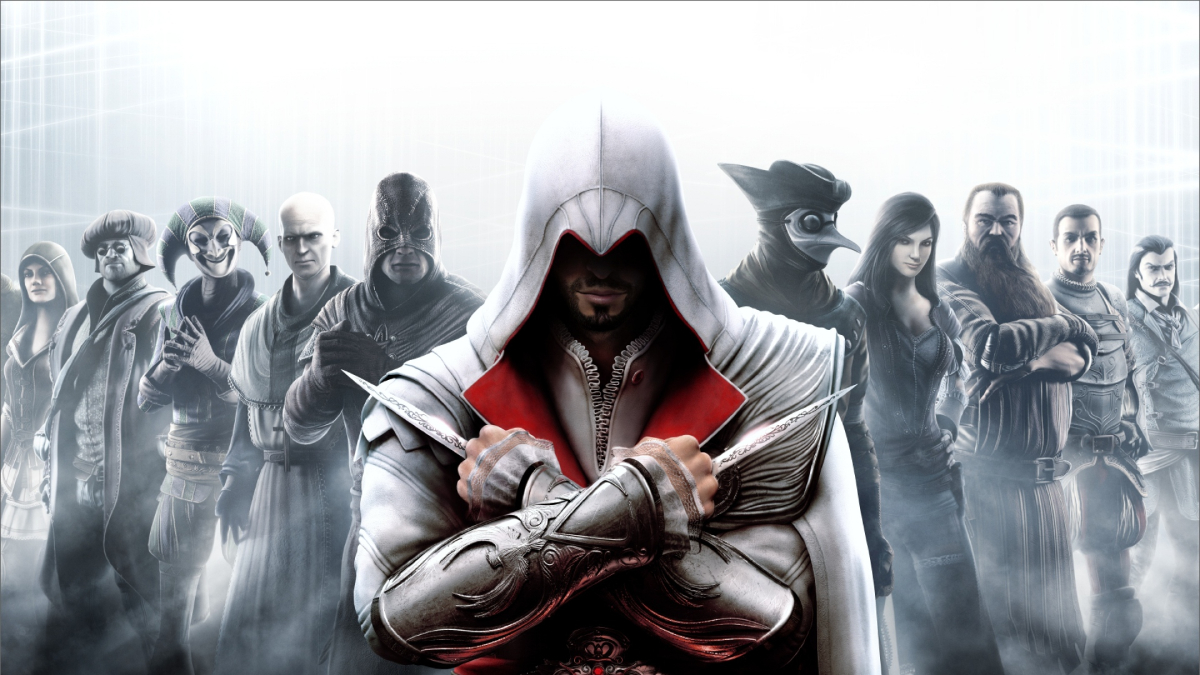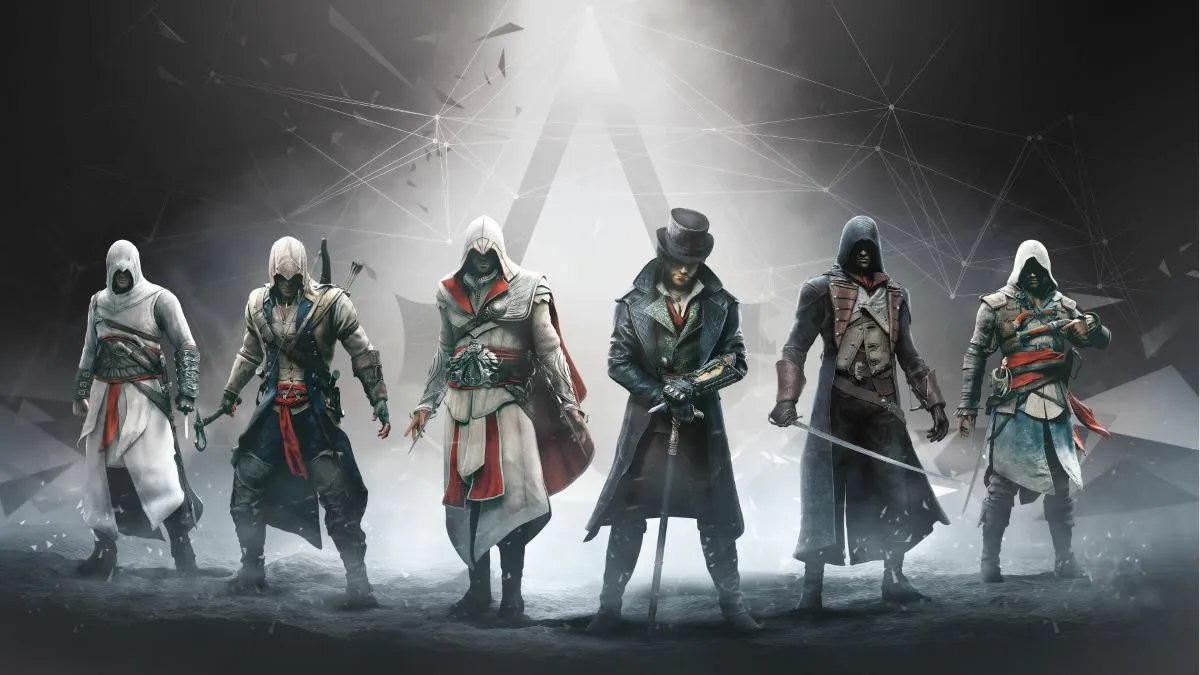Since its inception in 2007, the Assassin’s Creed franchise has been weaving together a tapestry of history, intrigue, and action. With each installment, we’ve walked in the footsteps of legendary assassins and delved into the annals of history’s most pivotal moments. From the streets of Renaissance Italy to the Viking conquests of England, the series has explored a plethora of eras and locations.
At PC Invasion, we’ve embarked on an adventure of our own as we rank all the Assassin’s Creed games, evaluate their narratives and gameplay mechanics, and see how earlier installments hold up today. If you’re looking to find which Assassin’s Creed games to play right now, or simply just want to see how they rank against each other, this is the place to be. So, don your hoods and grab some popcorn as we dive into the immersive world of the Hidden Ones, and discover which chapters of this legendary saga have left the most lasting marks on our hearts.
13. Assassin’s Creed Valhalla (2020)

Valhalla brings the Assassins into the Viking Age with an open-world adventure RPG. This game introduces Eivor, a fierce Viking raider who embarks on a journey to settle in England and carve out a new home for their people. To sum up Valhalla in two words, I’d say it’s boringly long. At around 60-70 hours, the Viking RPG is too long for its own good. The fact that there isn’t much that stimulates you in those hours doesn’t make things better. Yes, game companies think everyone wants bigger, expansive worlds with loads of things to do and items to collect, but the thing is, “more things to do” doesn’t mean “getting to do essentially the same thing countless times”. I think having a denser, smaller world with a much larger variety of meaningful things to do would’ve done better for Valhalla than the padding that’s in it now. As for combat, melee battles feel hazy and unsatisfying with you just sitting there, chipping away at an NPC’s health.
12. Assassin’s Creed Odyssey (2018)

Assassin’s Creed Odyssey is an ancient Greek RPG with the Assassin’s name attached to it. I want to make this clear so you don’t go in with the expectation of Odyssey resembling what the Assassin’s Creed games are known for. The signs pointed to Ubisoft wanting to branch out to RPGs while keeping the Assassin’s name for the goodwill it has created, however much that may be. As a standalone RPG, Odyssey has a heartfelt main story with surprisingly heart-wrenching decisions, that turn what seem like minor side missions into emotional and meaningful encounters. The storyline is engaging enough that you want to keep playing to find out what happens next, up until the point where the action stops because your level isn’t high enough.
11. Assassin’s Creed Syndicate (2015)

The first game to feature both a male and female protagonist, Syndicate had a great brother-sister dynamic set in the 2nd modern setting of the series, after Unity. The streets of London in the Industrial Revolution feel accurately gritty and smoky. The story is good enough to pay attention to but it’s the parkour that takes the main stage. But sadly, it was in Syndicate where I felt the brunt of microtransactions. Syndicate opted for an annoying intertwined skill tree and leveling system while neatly displaying “Helix Credits” in the main menu which would allow you to circumvent the grinding. Otherwise, you had to complete tons of boring “liberation missions” in order to level up. These missions sound interesting but get repetitive and grindy pretty quickly.
10. Assassin’s Creed Origins (2017)

Now this is where the franchise took a complete turn. Assassin’s Creed Origins was the first installment that truly turned the franchise from a stealth-focused, linear series into a borderline fantasy RPG/history simulator. The game itself, while not quite amazing, holds up pretty well with its majestic desert setting. Bayek’s journey is one that’s worth staying for but those side missions are not. As for parkour, it has been incredibly simplified to where you can just climb anything with little to no effort at all.
9. Assassin’s Creed Rogue (2014)

If you feel like switching teams, Assassin’s Creed Rogue is the answer for you. This was the first game where the main character you play is a Templar hunting Assassins. It bears a lot of similarities with Black Flag, even the naval combat is a copy and paste. The only thing this game has got going for it is a twist in the series story, though being a Templar was not fully explored. Rogue is not a bad game per se, but quite repetitive once you’ve already played Black Flag.
8. Assassin’s Creed III (2012)

While Ezio’s story ended with revelations, Assassin’s Creed III is the actual ending for the game’s main story of Desmond Miles in the modern day, which started back in the first Assassin’s Creed. Assassin’s Creed III’s parkour was simplified for fluidity but, I guess, not tested enough against the new additions of climbable trees and cliffs, leading to sometimes wonky and uneven movements. In the name of historical accuracy, precious development time went to building muskets that you would use once and never again because, by the time you’re able to finish reloading, you’d be well dead. Having more modern-day missions than the previous games combined (at least, that’s what it felt like) didn’t help either. Why would I want to visit some derelict stadium when I can free-run on top of buildings during The American Revolution? I will say that the number of things to do was quite plenty as well as fun. With the addition of hunting and a whole area called the Frontier you could explore, you could spend hours in-game without feeling bored.
Related: How to register for the Assassin’s Creed Codename Jade Closed Beta
7. Assassin’s Creed Mirage (2023)

Assassin’s Creed Mirage takes players back to Basim’s past before his role in Valhalla while going back in time in real life to what made the Assassin’s Creed games iconic in the first place. While exploring Baghdad is a delightful experience, the story itself has some shortcomings. The plot is not really cohesive in the way the original games were, and the major narrative is conveyed primarily through imprecise facial animations and awkward gestures. The gameplay makes up for the flaws in the story and characters with a beautiful parkour system where the city of Baghdad acts as your playground, allowing you to maneuver around the densely created city with elegance. Combat itself is quite impactless unless you’re parrying or assassinating but there is the welcome return of the notoriety system, mercenaries, and merchants/courtesans for stealth purposes.
Related: Assassin’s Creed: Mirage review – Out with the new, in with the old
6. Assassin’s Creed (2007)

Ah, where it all started. The introduction to the Order of Assassins, Altair’s charisma, and a wonderfully put-together story are some of the reasons Assassin’s Creed deserves this place. But while it held its own when it was first released, Assassin’s Creed was more of a proof of concept, a test if you will, to see if providing a well-researched historical sandbox where you can climb anything would be something that players want. It seems they did, and Assassin’s Creed went on to be perfected in the sequels into the gaming behemoth it is today. Several iterations have vastly improved the combat and parkour from the initial game, so unfortunately if you’ve played any of the recent installments and go back to the first game, it feels like switching out your keyboard for a typewriter.
5. Assassin’s Creed Unity (2014)

Set in 18th Century France with the French Revolution on the rise, Unity is probably the liveliest game of the series. Arno Dorian is an ambitious yet charismatic character and I would put him in the top 3 of my favorite protagonists, after Ezio and Edward Kenway. The real star of AC Unity, however, is the world itself. Assassin’s Creed Unity took the parkour from previous games and leveled it up a few notches. The fluidity in Arno’s movements, while parkouring the dense landscape of Paris, is an unparalleled thing of beauty which leaves me dumbfounded as to what was going on at Ubisoft when they decided to downgrade parkour in subsequent releases.
4. Assassin’s Creed: Brotherhood (2010)

Brotherhood is the shortest game in the Ezio trilogy. Set in the heart of Renaissance Rome, this installment is a captivating continuation of Ezio’s journey. What set Brotherhood apart when it launched was its introduction of the assassin recruits you could send on missions which added a layer of strategic depth to the gameplay. The game’s portrayal of Rome, with its bustling streets and iconic landmarks, created an immersive experience. It may be a bridge between two more extensive chapters, but Brotherhood stands strong as a remarkable entry in the Assassin’s Creed series.
3. Assassin’s Creed: Revelations (2011)

Revelations is a poignant story portraying the beginning of the end for one dashing Assassino. This one is a must-play after AC II and Brotherhood. The culmination of Ezio’s arc is portrayed beautifully as he finally comes to terms with his purpose in life. After all the loss, and all the bloodshed that we witnessed in the first parts of the trilogy, we get to see him finally rest. The gameplay improvements aren’t massive, but they are appreciated. The new hookblade is a fun thing to play with but it also has its uses.
2. Assassin’s Creed IV: Black Flag (2013)

Yarr Matey! Black Flag is as much of a pirate game as it is an Assassin’s Creed game, but it was careful to do both of those things right. You play as Edward Kenway, a swashbuckling privateer out to earn some coin so he can live happily ever after with his wee lass. But things take a turn when Kenway gets thrown into a world that he doesn’t recognize, full of mysterious organizations and weird artifacts. If you want to experience the closest game to the originals without the dated graphics, Black Flag should be your choice. The ship battles are one of the many things that were done amazingly well. Battles are intense and powerful. Each shot of your cannon feels heavy just like it should be. And when you go in for that final ram finisher, boy does that feel awesome. The game does come with its caveats though. For starters, there are just too many tailing missions. I mean, way too many. And while the story is beautifully done with an ensemble of rich characters and plot points, it doesn’t make as much of a lasting impact on the universe as a whole.
1. Assassin’s Creed II (2009)

The number one spot on our list goes to none other than Assassin’s Creed II. I can’t say much about the amazing story without giving away spoilers, but Assassin’s Creed II stands out with its display of the redemption of Ezio, an arrogant, young womanizer who becomes burdened with responsibility and steps up to care for and protect his family, all the while working towards something much bigger than himself. Amazing side characters like the famous Leonardo Da Vinci gave every facet of the story heart and the planned leveling up with Da Vinci’s help was a very smart syncing of story and gameplay. The combat had a satisfying flow from one enemy to another and it was glued together by a plethora of impactful, awesome takedowns. In short, if you want to experience the best an Assassin’s Creed game has to offer, look no further than Assassin’s Creed II.








Published: Oct 12, 2023 04:27 pm